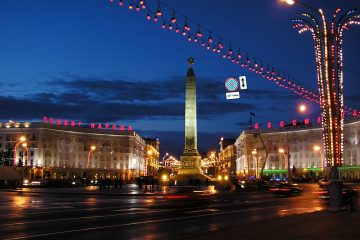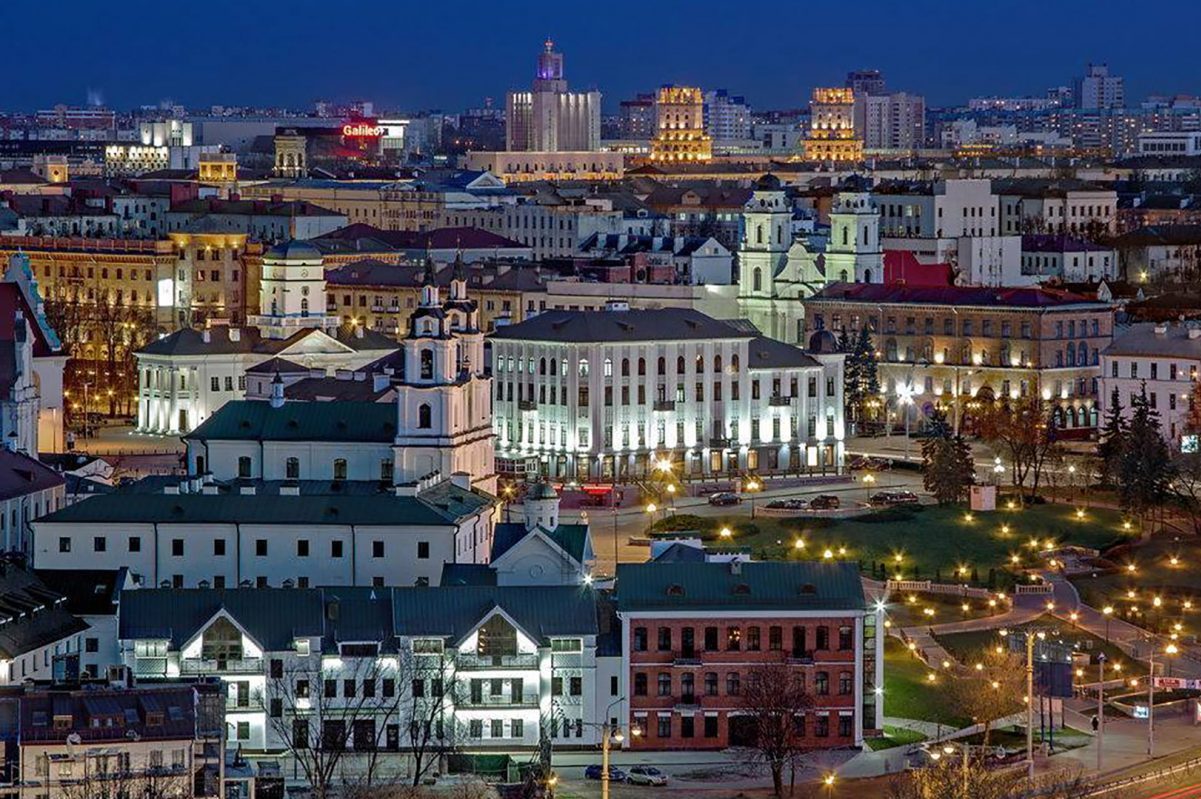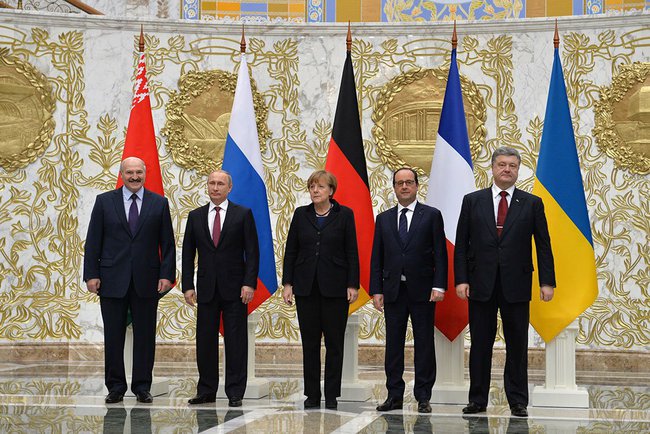2019-2020 Strategy Paper
Two anniversaries that occurred in Belarus in 2019 were symptomatic of the current situation of the country, partly with respect to the contrast they evoke: 20 years ago, Belarus and Russia signed the Union State Treaty, and 25 years ago, Alexander Lukashenka was elected as Belarus’s first and, thus far, only president. While Lukashenka succeeded in consolidating and perpetuating a textbook example of an authoritarian regime over the two and a half decades of his time in power, the Union State remained a hollow shell, one rich in declared political intentions but achieved no notable political impact.
There was no fundamental change in the geopolitical and regional political situation for Belarus in 2019: Relations between Russia and the West continued to be very poor, including the ongoing sanctions imposed in response to Russia’s annexation of Crimea. Belarus’ economic dependency on Russia continued and Belarus’ relations of Belarus with the EU as a whole and Lithuania, Belarus’ neighbour to the north, remained very strained – in the latter case due to the upcoming commissioning of the nuclear power plant in Astravets. The unstable situation in Ukraine, Belarus’ neighbour to the south, also continued, due to the continuing war in eastern part of that country. Lukashenka’s reaction to the difficult geopolitical context in which Belarus finds is typical of him: he has remained steadfast in his refusal to grant de jure recognition of the annexation of Crimea, calling on Ukraine to remain united on this issue at an interview with Ukrainian journalists in September, but he has also made no bones about his realpolitik-based assumption that Russia will not give Crimea back to Ukraine, even should there be change in political leadership there.
Against the backdrop of this “multivector rhetoric” on Lukashenka’s part, the following appear to us to be the areas of greatest significance in 2019 for guiding strategy in dealing with Belarus moving forward: discussion about further integration of Belarus and Russia, relations between Belarus and the West, the situation of civil society, the economic situation in Belarus, and the parliamentary and presidential elections
Union State 2.0: Discussion about further integration of Belarus and Russia
Further integration of Belarus and Russia within the framework of a resurrected Union State concept was the leitmotif of meetings between Vladimir Putin and Alexander Lukashenka in 2019. Concluded in 1999, the Union State Treaty provided for the two states to coordinate certain areas of economic, foreign and security policy, and even pursue a common policy in some areas, while maintaining their sovereignty.[1] However, two decades later, most of the elements of this treaty still exist only on paper, as there was no political will on either side to implement it during that period.
In 2019, the Russian leadership reactivated the Union State concept as a way to put political and economic pressure on Belarus. Russian media reports, accompanied by provocative statements of the kind one has come to expect from Putin (“Belarusians and Russians are one people, just living in two states”), stirred up speculation about a more far-reaching document representing a sort of roadmap for further integration of the two countries which, it was claimed, would be signed on 8 December (the official “birthday” of the Union State). There was talk of a uniform tax code, the creation of a common regulatory authority for the energy market, closer cooperation between customs authorities and coordination of the positions on Western sanctions against Russia and countermeasures by Russia. The information, deliberately disseminated by Russia, led to highly charged debates, in the West and in Belarus, about an imminent loss of Belarusian independence, potential scenarios for Belarusian integration into the Russian Federation and about Russia’s real intentions. One explanatory model posited that Putin, who is constitutionally barred from starting a fifth term in the presidency in 2024, might intend to get around this by creating a new Russian-Belarusian state.
The official Belarusian line on fears of a loss of state sovereignty was that this was nothing but “unjustified demonising” (Natalya Eismont, Lukashenka’s press secretary). And, upon closer examination, it does not appear that either a common fiscal policy or a common regulation of the energy market would be in Russia’s interest, as instituting these would reduce of Russia’s economic leverage, important to the Kremlin as a means to keep Lukashenka in line. For its part, Belarus cannot be expected to consent to the presence of Russian customs officials on its own western border, as this would be very visibly signal a relinquishment of state sovereignty on its part.
It is not possible to assess how extensive, serious or, above all, enduring integration commitments might turn out to be or which scenario is most likely to occur in the end on the basis of independent sources. However, Moscow is clearly trying to keep Belarus on a tight rein lest a sense of a separate national identity and of the value of independence from Russia consolidate there, and it is important to bear this in mind.
Moderate thaw: Belarusian relations with the West
The cautious turn towards the West that Belarus began in 2015 continued in 2019. Some of the indications of this: The rules for the entry of EU citizens to Belarus were further simplified.[2] The EU supported circa 4,500 SMEs to find new markets, thus contributing to the creation of 4,000 new jobs in the SME sector. The mandate of the European Bank for Reconstruction and Development (EBRD) was significantly expanded, with an investment portfolio of 683 million euros. Flanking the EU’s engagement, John Bolton visited Minsk in August, the highest-ranking American official to do so in 25 years, where he engaged in talks on a new exchange of ambassadors with Belarus.
The background to Belarus’s cyclical turns to and away from the West – which have been aptly described as the pendulum policy – remains unchanged: Lukashenka needs the West as a counterweight to Russia’s influence in his country and the threat it poses to his personal power as well as to enable him to keep calling for new concessions from Russia. He is also trying to foster the illusion in the eyes of the West that Belarus might “diversify” its foreign policy and emancipate itself from the dictates of Russia. The EU must face the fact that Lukashenka’s foreign policy space is strictly limited: Moscow will do anything to prevent Belarus from becoming an unreliable ally and thus the loss of its strategic buffer zone vis-à-vis the West and NATO. Lukashenka himself is well aware of this: he knows that he must not push the Kremlin too far by getting too close to the West. This means that the EU must strike a fine balance between measures aimed at safeguarding Belarusian sovereignty and a realpolitik-based acceptance that Russia has the stronger hand when it comes to relations with Belarus.
Paradoxical dependency: Economic developments in Belarus in 2019
Belarus reported positive, though weak, economic growth in 2019, driven primarily by domestic demand. At circa 1.8%, the growth was considerably slower than that seen 2018 (3.0%). The interruption in deliveries of crude oil that resulted from the discovery of the contamination of the Druzhba oil pipeline in April of 2019 was the primary factor in the slowdown. The supply disruption resulted in an almost 10% reduction in the production of petroleum products, which are one of Belarus major exports, primarily to the EU. The economic situation was further exacerbated by trade disputes with Russia, including a Russian ban on the import of various meat and dairy products from Belarus.[3]
Belarus’s economic dependency on Russia continues to be paradoxical: while economic ties with Russia are so important to the country’s survival that they can call the political independence of the Belarusian state into question, Lukashenka keeps finding ways to resist economic pressure from Russia. Symptomatic of this paradoxical situation in 2019 was what is known as the “tax manoeuvre” in the oil sector: Russia drastically reduced oil export duties, raising the tax on mineral extraction proportionally. It is estimated that Belarus lost estimated 2 billion US dollars in revenue in 2019 because if this. Russia offered its own refineries compensation for the losses, a move labelled by Belarus as distortion of the competitive environment within the framework of the Eurasian Economic Union (EAEU), to which both states belong. Russia’s response: if Belarus wanted better conditions, further integration with Russia was the way forward. Many in Minsk had fundamental doubts about whether Moscow intended to fulfil its obligation under the EAEU treaty to create a common oil and gas market and did not initially appear willing to make further concessions to Russia.
Leaving aside the economic conflicts between Belarus and Russia that have been running along similar lines for years, the numbers tell a clear story here: the Belarusian economy has been “subsidized” on the scale of 7-9 billion euros annually, 50% of direct investment in Belarus originates in Russia and Russia’s state-controlled Gazprom owns 100% of the strategically important Gazprom Transgaz Belarus (formerly Beltransgaz), which operates the natural gas pipeline that transports Russian gas to Europe. Thus far, attempts to diversify the Belarusian economy by strengthening ties with Turkey and China have produced no visible results.
Authoritarian power vertical intact: the situation of civil society in Belarus in 2019
The internal situation in Belarus appears stable, as – unlike the case in Russia – the authoritarian power vertical is functioning and the political opposition, independent media and free civil society have been successfully marginalised over the years. There is space for activity by civil society, provided this activity is of a non-political nature, however open discussion of political ideas or positions, criticism of the status quo and the formation of political movements that might resonate with the public are all unthinkable. The 2019 report of the UN special rapporteur on the situation of human rights in Belarus alludes to the continuing use of the death penalty and cases of torture and abuse of detainees, while acknowledging that there had been small steps made in the right direction, such as the de-criminalisation of the activities of non-registered organisations through the repeal of article 193.1 of the Criminal Code, and legislative improvements relating to freedom of assembly.
Activity by independent, pro-democratic civil society organisation is possible, even official activity and even when foreign funding is involved, provided that the authorities have far-reaching control over the use of funds. Specific projects aimed at cooperation between civil society and local authorities can help lay a foundation for trust across sectors, which will be necessary to support democratic development in the country once major political change sets in. However, it is essential that such projects do not become an end in themselves, nor be used to lend legitimacy to authorities which have, in fact, fitted themselves unprotestingly in the authoritarian power vertical. Where there is no willingness to open up to democratic participation this must be openly stated. International donor organisations must realise that their provision of financial assistance for trans-sectoral cooperation projects in the country can be interpreted as the outside world accepting the legitimacy of existing authoritarian structures and thus ultimately contributing to their stabilisation. The provision of direct support to independent civil society should therefore always remain an important option used to challenge the status quo by international donor organisations.
2019 parliamentary elections/2020 presidential elections
After two “independent” candidates won seats in the last parliamentary elections in 2016, many political observers expected to see this become a trend in 2019. The opposite was the case though. International and independent domestic election observers reported a greater number of violations of election laws than they had in the parliamentary elections of 2008, 2012 and 2016. There was neither equal access to mass media nor a balanced electoral commission. Various obstacles were placed in the way of independent candidates during the campaign period, and the misuse of administrative resources put independent candidates at a disadvantage in the election. Significant irregularities were noted in connection with early voting in the five days before election day and with the use of mobile ballot boxes. Ballot counting was largely non-transparent, making it impossible to confirm the official election results. In addition, doubts were raised as to whether the minimum voter turnout of 50% of the electorate, required for valid parliamentary elections, was met. The official voter turnout of 77% could not be verified by independent observers due to the shortcomings in the counting of votes referred to above.
The massive scale of intimidation aimed at independent candidates, commission members and voters through the entire election process indicates that the regime has no intention of allowing any scope for freedom of choice or action to arise in the few months before the presidential election in the summer of 2020 and that it plans to control the process and results of that election as well.
Summary / Recommendations
In our view, the following recommendations can be drawn from the developments in Belarus in 2019, as described above:
- Freedom of movement: Over the past two years, Belarus has, unilaterally, substantially simplified restrictions on the entry of EU citizens, now it is the EU’s turn to introduce freedom of movement for Belarusian citizens thereby demonstrating that the people of this country, so isolated politically in other ways, are welcome in Europe. It is obvious and indisputable that this step, which has topped the list of recommendations for years, would increase the standing of the EU in Belarus with lasting effect.
- Belarus, rather than Weißrussland (White Russia): Sweden has officially decided to stop using the word Vitryssland, replacing it with Belarus; Germany should follow its lead, and no longer refer to Belarus as Weißrussland. The German Foreign Office has set a good example on its website and the central news programmes in Germany have also begun changing their usage. Naturally, getting the part of the German public that has no other connection with Eastern Europe to internalise the change of name will involve a longer process.
- Strengthening independent civil society: Political change in Belarus may come unexpectedly and suddenly. People, and above all decision makers in Germany and the EU, should be made more aware of this. For such change to bring about democratic transformation, there must be independent actors who support an open society based on European values who are ready and able to promote such transformation. Therefore, the EU should continue to offer funding programmes for critically minded democratic actors (journalists, researchers, NGO representatives or artists).
- Promoting economic cooperation: Economic pressure is one of the main means that Russia uses to keep its neighbouring countries in line politically. The examples of Georgia and the Republic of Moldova, but also that of the Ukraine, have shown that an economic diversification that a country is forced to undertake as a result of Russian boycotts or bans (of, for instance, wine from Moldova, mineral water from Georgia) can help free them from their political and economic dependence on their aggressive and authoritarian neighbour. The EU should recognise that promoting the diversification of the Belarusian economy and the associated strengthening of Belarus’s political independence is in its interests. In this context, it should place less emphasis on state economic cooperation, focussing instead primarily on the development of an independent SME sector.
- Formulating strategic objectives: The EU should formulate its objectives in its dealings with Belarus more clearly and pursue an active policy on that basis rather than a reactive policy based on developments in the country. The guiding principle here must be that of strengthening Belarusian independence while insisting on democratic standards and respect for human rights. The EU has the opportunity to promote a gradual opening of democratic space for the people in Belarus, primarily in the pre-political context (exchange at various levels, support of local initiatives, citizen participation), and thus to help strengthen the democratic self-empowerment of society in the longer term.
- Clarifying the cases of the disappeared: Twenty years ago, three people disappeared in Belarus: Yuri Zakharenka, a former interior minister, disappeared on 7 May and Viktar Hanchar, former deputy chairman of the 13th Supreme Soviet, and the businessman Anatol Krasoŭski disappeared on 16 September. Their fates have never been clarified, and the consequences of this for Belarusian civil society are still to be felt today: those who openly contradict or actively oppose the authoritarian regime run the risk, at best, of a monetary fine and may well receive a prison sentence, and they must always consider the possibility of graver consequences for their health or lives. Germany and the EU should continue to keep the memory of these disappearances alive, insisting that the cases be clarified and calling for the criminal prosecution of those responsible. In 2020, the year marking the 20th anniversary of the disappearance of journalist Dzimitry Zavadski, the fate of the disappeared could be addressed within the framework of joint European-Belarusian (memory) projects.
Berlin, December 2019
Stephan Malerius, Chair
Stefanie Schiffer, Deputy Chair
Christoph Becker, Treasurer
Denis Friedrich, Advisory member
[1] For more on this see the summarizing article at BelarusDigest.com, “The State of the Union Belarus-Russia and the Virtual State”, https://belarusdigest.com/story/the-state-of-the-union-belarus-russia-and-the-virtual-state/
[2] A total of 244,000 persons entered Belarus without a visa in the first half of 2019, compared to the 37,500 who entered the country in the first half of 2017.
[3] For a good overview of the economic situation in Belarus see Newsletter 59 of the German Economic Teams Belarus at https://www.get-belarus.de/wordpress/get_blr_nl_59_2019_de/


